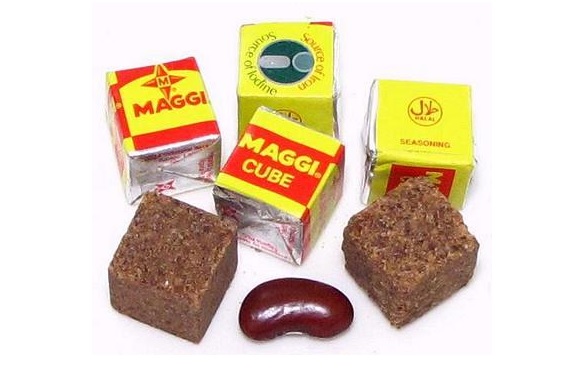Maggi cubes is an international seasoning product that is available for sale in many countries of the world. In Nigeria, the product has successfully displaced traditional food seasonings such as locust beans that you are not likely to miss Maggi cubes in our delicacies. It could even be in the last cooked meal you took.
The success of Maggi cubes is majorly due to their superior processing and packaging compared to the local alternatives. Each cube of Maggi is an exquisite blend of salt, sugar, monosodium glutamate, cornstarch, onion powder, and other ingredients that will keep you licking your lips for long.
The cubes are fortified with iron and other supplements to give you more than good taste. The iron in Maggi, for instance, protects you against iron deficiency anemia and gives you enough hemoglobin to transport oxygen across your body.
However, that is not always the case. Using a lot of Maggi cubes exposes you to some not-so-delicious side effects and even more dangerous health risks.
In this article, we highlight the side effects and health risks of Maggi cubes consumption, so that you can make an informed decision about the use of Maggi cubes in your food.

Side effects of Maggi cubes
Although Maggi cubes add great taste to your food, you won’t find their side effects palatable if you add them in excess. Taking too much of Maggi loads you up mainly with high levels of trans-fat, iodized salt, and monosodium glutamate (MSG), which are not ideal for your health.
Common effects of this high intake include:
- Headache
- Nausea
- Vomiting
- Fatigue
- Thirst
- Skin rash
- Increased bowel movement
Health Risks of Maggi Cubes
The aforementioned side effects could transform into greater health risks if you persist in using a high dose of Maggi cubes. These health risks are significant. That is why we highlight them in greater details as follows:
Hypertension
The sodium content in Maggi cubes is high, and thus increases your chances of having hypertension in the long term. A high level of sodium in your blood causes fluid to collect around your heart and thereby elevates the pressure in your blood vessels.
Like many flavoring agents, Maggi cubes are a combination of several components including salt. The salt in Maggi is a mixture of sodium and chloride fortified with iodine. Sodium is supplied also by MSG. These two sources combine in a cube of Maggi is to give an average sodium content of 1000mg per cube, which way beyond the about 186mg of sodium you need per day for good health.
Excessive use of sodium is not ideal for your health. Although your body could filter out some of this sodium through urine, a significant percentage is retained. It is this percentage that causes some of the many diseases associated with high sodium intake.
For instance, several studies have demonstrated a strong link between sodium intake and high blood pressure. The studies found that those with higher sodium intake present more with high blood pressure than those who consume less. This correlation is particularly evident in people history of hypertension, diabetes, and chronic kidney diseases.
It is against this background that the WHO recommends you keep your sodium intake to about 2,000mg per day. Keep this in mind the next time you are in the kitchen.
Stroke and heart attack
You are at risk of having heart disease if you consume a high dose of trans fats via Maggi cubes. These fats can coat your arteries and limit the flow of blood to the organs in your body. This results in stroke and heart attack if the fats clog arteries that supply sensitive organs like the brain and the heart.
The fats in your Maggi cubes come in the form of hydrogenated fat that is used commonly in processed foods and snacks. However, they are also a source of trans fats. Trans fats are unsaturated fatty acids that occur in natural and artificial forms.
You don’t need to worry about natural trans fats. This type of fat is a natural component of your meat and dairy diet, where they exist in relatively low amounts that is safe for your health.
However, the processed trans fats–like the ones in Maggi cubes–can be harmful to your health. In the cubes, vegetable oils are chemically processed into solid forms at room temperature.
Although trans fats change into oil during cooking, they can change again into solid when they get into the body. Once in, the fats build up your body content of low-density lipoprotein (LDL) or the “bad cholesterol” that you must have heard about.
As a result, trans fats put you at great risk of developing heart diseases like those mentioned above, as well as diabetes. This is why you need to make smarter decisions regarding your use of Maggi cubes.
Neurotoxic effects
Another possible consequence of excess intake of Maggi cubes is that it can interfere with your nervous coordination. Maggi cubes contain MSG which can mimic glutamic to act on their receptors in the brain.
Glutamic acid acts as a neurotransmitter in the brain to stimulate nerve cells involved in involuntary and metabolic activities. Glutamic acid is found naturally in plants and food products. In commercial products, starch is fermented to produce MSG, which is the main flavoring agent in Maggi cubes.
Large doses of MSG in your blood increase the amount of glutamic acid in your brain, which translates to high glutamic acid activity and its associated effects which include:
- Headache
- Pain
- Sensitivity of pericranial muscles to touch and movement
- Rapid heartbeats
- Nausea
A dietary dose of Maggi cubes contains 0.5g of MSG per portion. However, these effects are only pronounced when you consume large doses of MSG, usually in the excess of 3g per meal.
Even then, only sensitive users are more likely to demonstrate these adverse effects of MSG. These are people within the MSG symptom complex. Dietary levels of MSG have not been shown to produce any harm in the brain.
Nevertheless, it is better to keep it safe when using Maggi cubes. If you react to MSG, you should use suitable replacements for Maggi. If you don’t react to it, keep to moderate levels of use. This way, you wouldn’t have to worry about the side effects of MSG. However, if you can, steer clear of MSG-containing seasonings in favor of natural seasonings and spices.


